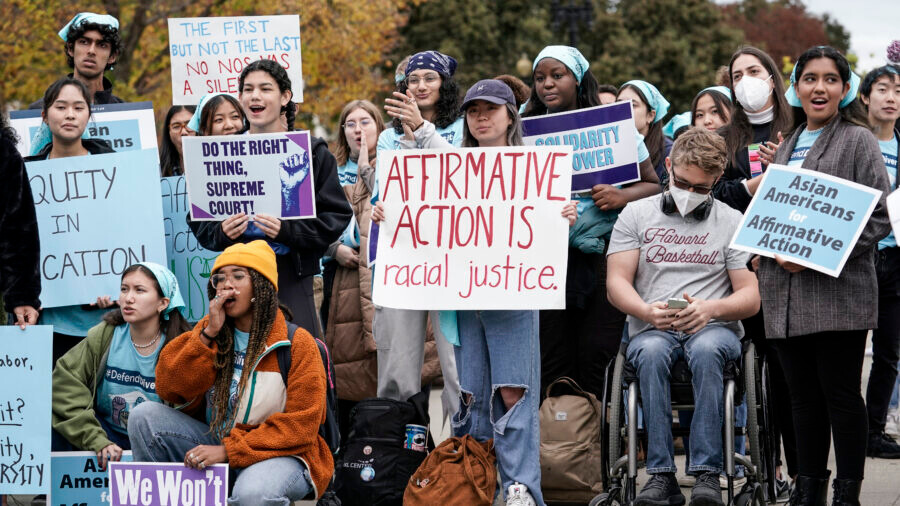Rethinking Affirmative Action: Striking a Balance for a More Inclusive Future (Also Me)
Affirmative action encompasses a set of policies aimed at enhancing representation and opportunities for historically disadvantaged groups, including racial minorities, women, and individuals with disabilities, in education and employment. This has been a subject of ongoing debate in American society. Advocates argue that it addresses past and present discrimination and promotes diversity, while critics contend that it is unfair, ineffective, and counterproductive.
The Current Political Landscape
Since its inception in the 1960s, affirmative action has been a contentious topic. The Supreme Court has ruled on various cases related to affirmative action in higher education, including Bakke v. Regents of the University of California (1978), Grutter v. Bollinger (2003), Fisher v. University of Texas (2016), and Students for Fair Admissions v. Harvard (2021). The Court generally upholds affirmative action's constitutionality when it is narrowly tailored to achieve diversity without using strict racial quotas.
However, the Court's composition has changed, and some believe that the conservative majority may overturn or limit previous affirmative action decisions. In October 2021, the Court agreed to hear two cases challenging race-conscious admissions policies at Harvard University and the University of North Carolina at Chapel Hill. The plaintiffs, represented by the anti-affirmative action group Students for Fair Admissions, allege that these policies discriminate against Asian American applicants and violate their equal protection rights.
In June 2023, the Supreme Court issued a significant ruling in Students for Fair Admissions v. Harvard, declaring race-conscious college admissions processes unconstitutional under the 14th Amendment's Equal Protection Clause. This effectively ended affirmative action. However, the ruling does not explicitly apply to U.S. military academies and allows for the consideration of race to be directly linked to a unique ability or character quality the applicant brings to the university.
Advocates of affirmative action argue that it promotes social justice by addressing historical and systemic oppression certain groups face. It is viewed as a form of reparations for enduring inequalities resulting from slavery, segregation, colonialism, and other injustices.
Another argument in favor of affirmative action is that it boosts social mobility and economic development by providing access to education and employment for individuals who might face barriers and discrimination otherwise. This can break the cycle of poverty and marginalization, contributing to a more diverse and skilled workforce, and ultimately fostering societal growth and innovation.
A third point in support of affirmative action is that it cultivates diversity and inclusion in historically dominant institutions and sectors. This, in turn, promotes a more representative and democratic society, where diverse perspectives, experiences, and cultures are valued and respected. Diversity can also enrich education and work by exposing individuals to a range of ideas, challenges, and solutions.
Opponents of affirmative action argue that it undermines the principle of meritocracy, where individuals are rewarded based on their abilities and accomplishments, not their identity or background. They see it as a form of reverse discrimination or preferential treatment, potentially disadvantaging or excluding qualified individuals from non-targeted groups.
Another objection is that affirmative action may be ineffective or even detrimental to its intended beneficiaries, potentially lowering standards and expectations, creating a stigma or resentment, and eroding the self-esteem and motivation of targeted groups.
A third argument against affirmative action is that it is outdated or irrelevant in contemporary society, where discrimination and inequality may no longer be as prominent, or where factors like class or geography may outweigh race or gender in importance. It is also viewed as a policy that may exacerbate differences and conflicts among groups rather than fostering unity and harmony.
My Conclusion
After evaluating the merits and drawbacks of affirmative action, and considering the current political landscape, I have arrived at my own conclusion on this matter. We should uphold the principles of meritocracy and focus on advancing the development and improvement of marginalized communities to bring them on par with other college applicants.
I firmly believe that meritocracy constitutes a fair and efficient system that rewards individuals for their talents and efforts, regardless of their race, gender, or other uncontrollable factors. Affirmative action, in my view, amounts to discrimination, infringing upon the rights and dignity of individuals who are assessed based on their group membership rather than their personal merits. Additionally, I believe affirmative action is counterproductive, generating resentment and animosity among groups while diminishing the standards and quality of education and work.
I do not dispute the presence of lingering inequalities and disadvantages that affect specific groups more than others. However, I do not believe that affirmative action represents the best approach to address these disparities. Instead, I advocate for a focus on improving conditions and opportunities for all individuals, particularly those who are economically disadvantaged or underprivileged, without regard to their race or gender believe that we should invest more significantly in education, healthcare, infrastructure, and social welfare, ensuring that quality and affordable services are accessible to all. Additionally, combating discrimination and prejudice in all forms and promoting a culture of respect and tolerance for diversity are essential.
I hold that by taking these measures, we can forge a more equitable and prosperous society in which everyone can attain their full potential and contribute to the common good.
Peace Out

Comments
Post a Comment